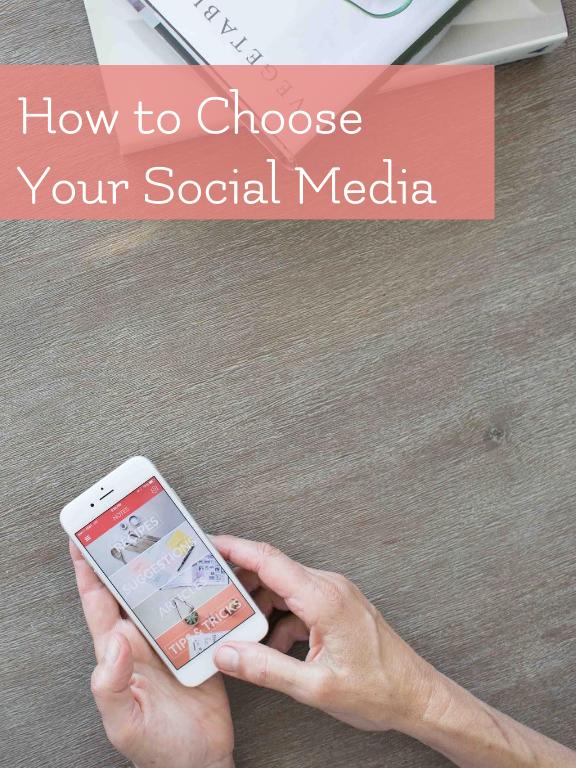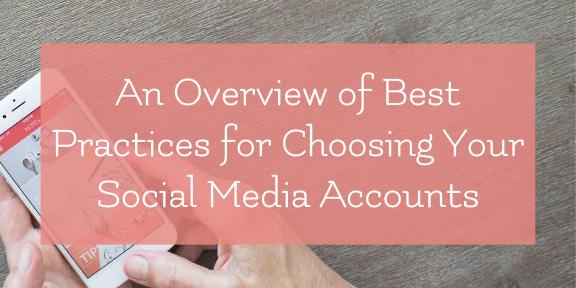When I talk with clients about their online presence, one of the first questions I get is, “How many social media accounts should I have?”
My answer:
More than zero – because I think everyone should have a LinkedIn account. Beyond that, though… it depends.
I know, that’s not very helpful, is it? Don’t worry, I’ll go a little deeper.
Choosing social media for your business is not a one-size-fits-all decision. You should choose where to focus your efforts based on your business, your industry, and your personality.
More than zero, but less than…
The first rule of using social media: you have to use it. This means that you should never have more social media accounts than you (or the person/people in charge of them) can actively manage. The point of social media is, after all, to be social: to interact with your customers, to make connections in your industry.
Simply name-squatting on different platforms does nothing for you business and can, in fact, make you look bad.
For example, if your social media links look like this:
You have too many. Because no one can actively manage that many accounts.
Remember: actively managing your accounts means more than just popping up a tweet or a video once a month.
You should have some new content every business day, even if that’s just responding to comments or content that other people post. And if your customers try to reach you on social media, you should be able to respond promptly and helpfully.
Which platforms should you pick?
Which social media accounts you use depends on the type of business you have.
A LinkedIn profile has become about as necessary as a resumé. If your business requires you to interact with anyone else – I’m pretty sure they all do – you should have one. If you work in a professional industry, LinkedIn will show potential clients your background and experience. For any small business owner, it’s also a great way for media and PR resources to learn about your business and reach out.
Twitter is great for any sort of business. It allows you to quickly respond to customers; connect with both your clients and others in your industry; network easily; and promote your business in easily-digested, 140 character bites. If your business requires a strong personal following, Twitter is a great place to create a community and share your personality.
Instagram is one of the most popular social media platforms with users under 35. It’s photo focus allows you to tell a story through images, create a strong visual brand, share behind the scenes images from your business, and show off new products or services.
Facebook is good choice if you are building a community with your customers and want to generate brand loyalty. You can easily share links, information, and photos — but given the evolving Facebook algorithms, you’ll need to pay for ads to ensure that your content is seen by your followers.
YouTube will encourage content sharing because videos are incredibly engaging in the online world. Promote your brand and expertise using tutorials, commercials, how-to videos, or even video press releases. All of these can be posted on YouTube and travel quickly around the internet.
Pinterest is a visual platform, so you have to share excellent images if you want others to be interested in them. It’s a good choice if you have visuals from a blog or products to share online. But if you’re just sharing other people’s content, it’s probably not a good use of your time.
Google+ is a way to create a business community and has the benefit of being accessible to anyone with a gmail account (and there are a lot of them out there). One of its best features is hangouts – with a hangout, you can host chats with customers or clients, or hold small-scale webinars at minimal cost.
Of course, there are dozens of others out there, and some are important for specific industries, so do your research. If you’re a writer, literary agent, or in the publishing community, you should have a GoodReads account. If you share a lot of links and images with your customers. Tumblr could be a good blogging platform for you.
And on that topic…
Social media + blogging go together
While it’s important to share others’ content and participate in the community of social media, you also need to be sharing your own content, and it needs to lead back to you.
And you don’t want it to just lead to your website: people will lose interest if they can tell that all you want to do is sell them something.
Instead, your social media accounts should tell a story on their own. They should engage your followers through appealing visuals and carefully written content. They should be interesting, and relevant, and make your customers feel like they care about them. And then they should lead back to your business blog, where you share more relevant, useful information that your customers will value. This, in turn, leads to name recognition and brand loyalty, which is exactly what you want for your business.
A final note…
Keep your personal and professional accounts separate on social media.
Yes, there are a few people out there who combine it all. Performers, writers, and professional bloggers often just have one account where everything goes. But for most people, you should keep your business profiles separate from your personal ones.
Don’t, for example, use your personal Facebook profile for your business, even if you’re currently the only employee. Instead, create a business page and use that. Not only will it make you look more professional, but it will reduce the risk of offending customers with controversial posts or confusing them with personal ones.
Setting up your social media strategy is, in the end, not very complicated. You just need to pick and choose:
…where you’ll be most effective.
…where your customers are.
…where you can be genuine.
*****
Need more than a quick overview of best social media practices? Confused about where to start or what is best for your business?
If you need help choosing where to focus your efforts, it’s time for a Real Advice session! We’ll work together to decide what is best for your business and most sustainable for your schedule, then come up with a launch and posting schedule so you can start seeing real results from your social media efforts.



For many business owners, the temptation is to use social networks to promote themselves and broadcast their messages. But if you stop thinking like a marketer and start thinking like a customer, you’ll understand that the secret to social media is in the “social” more than in the “media” – it’s in being human – being the sort of person at a cocktail party who listens attentively, tells great stories, shows interest in others, and is authentic and honest. The secret is to simply be likeable.
A great point, Coleman, and one that really can’t be stressed enough. You see the wrong kind of social media marketing all the time — businesses that just post about themselves, over and over. The smartest ones skip all that and just try to make genuine connections with their customers.